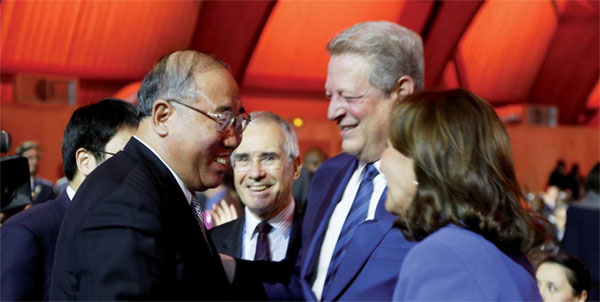China plays key climate role

Senior UN official cites commitment to using technology and new growth model
In the wake of the climate change agreement reached recently in Paris, China's contributions and experience will have both regional and worldwide benefits, a senior United Nations official says.
China's experience in implementing a low carbon roadmap will offer positive side effects, and its advanced technology and governance will help both developing and developed countries, according to Shamshad Akhtar, UN undersecretary-general and executive secretary of the UN Economic and Social Commission for Asia and the Pacific.
| China's Special Representative on Climate Change Xie Zhenhua (left) talks with French Ecology Minister Segolene Royal (right) and former US vice-president and environmental activist Al Gore ahead of the closing of the COP21 Climate Conference in Le Bourget, north of Paris, on December 12. Francois Guillot / AFP |
The agreement, announced on Dec 12, was praised as "a health insurance policy for the planet" by UN Secretary-General Ban Ki-moon.
The accord, reached among 195 nations, aims to limit the planet's temperature increase within an average of 2 C from preindustrial times in order to avoid the worst effects of climate change.
Akhtar, speaking on the sidelines of the Paris conference, said the strategic approaches already adopted by China, to enhance inclusiveness and combat climate change through strong political commitment, are impressive and will help reach critical goals.
"China needs to be commended for its decision to adopt a 'new normal' to rebalance itself to a more sustainable growth path," Akhtar said.
Halting the rise in global temperatures requires all countries to adopt low carbon development paths, officials have said, but it is an absolute imperative for countries emitting high levels of greenhouse gases and facing future economic and demographic pressures. This was driven home recently by Beijing's recent red alert for high air pollution levels, which shut down schools and factories and disrupted daily life.
China's importance to meeting climate goals is magnified given that it has the world's biggest population and a leading position in economic activity, energy consumption, trade and finance, and emissions, Akhtar said.
In response, China is helping show the way forward with such pledges as peaking its carbon dioxide emissions by around 2030 and increasing the share of nonfossil fuels in its primary energy mix to 20 percent.
China's game plan for its energy transition includes several components, but most critical will be the switch to renewable energy, including hydropower. Electric vehicles are growing in technology and acceptance. Balancing energy security and changing the energy mix will be critical for China to decarbonize its economy and meet its pledges, which will also be spurred by domestic technological advancement.
China is now leading the world in clean energy investment, with $81 billion spent last year, and it has emerged as a renewable energy innovation and manufacturing powerhouse, Akhtar said.
Ban, who returned to New York on Dec 13 from the two-week conference on the outskirts of Paris, said that there would be a high-level signing ceremony at UN Headquarters on April 22. He also said that the UN was planning "a big gathering of government, business and civil society" for an action summit on May 5 and 6.
In response to a query saying there were critics complaining the Paris accord was not strong enough, the secretary-general replied: "This is ambitious, strong. In terms of ambition, people have agreed to contain the global temperature rise well below 2 degrees, and we will continue to strive to beat this - even 1.5 degrees Celsius.
"This is a very ambitious target at this time. It has also very strong accountability and transparency. They have agreed to have a five-year cycle review."
Ban also pointed out that the nations agreed to have a review session in 2018, before the agreement takes effect five years from now, while the first official review session is due in 2023. "Therefore, it is quite strong and ambitious."
Asked if he thought there might be some positive spillover from the accord to other problems facing the world, Ban said: "I was encouraged and happy to see that all these 196 parties whether they even have their own domestic local challenges, they were united."
Xinhua News Agency contributed to this report.
(China Daily European Weekly 12/18/2015 page24)
Today's Top News
- New engine powers cargo drone expansion
- China to boost intl cooperation on green tech
- Factory activity sees marginal improvement in November
- Venezuela slams US' 'colonial threat' on its airspace
- Xi: Strengthen cyberspace governance framework
- Takaichi must stop rubbing salt in wounds, retract Taiwan remarks































